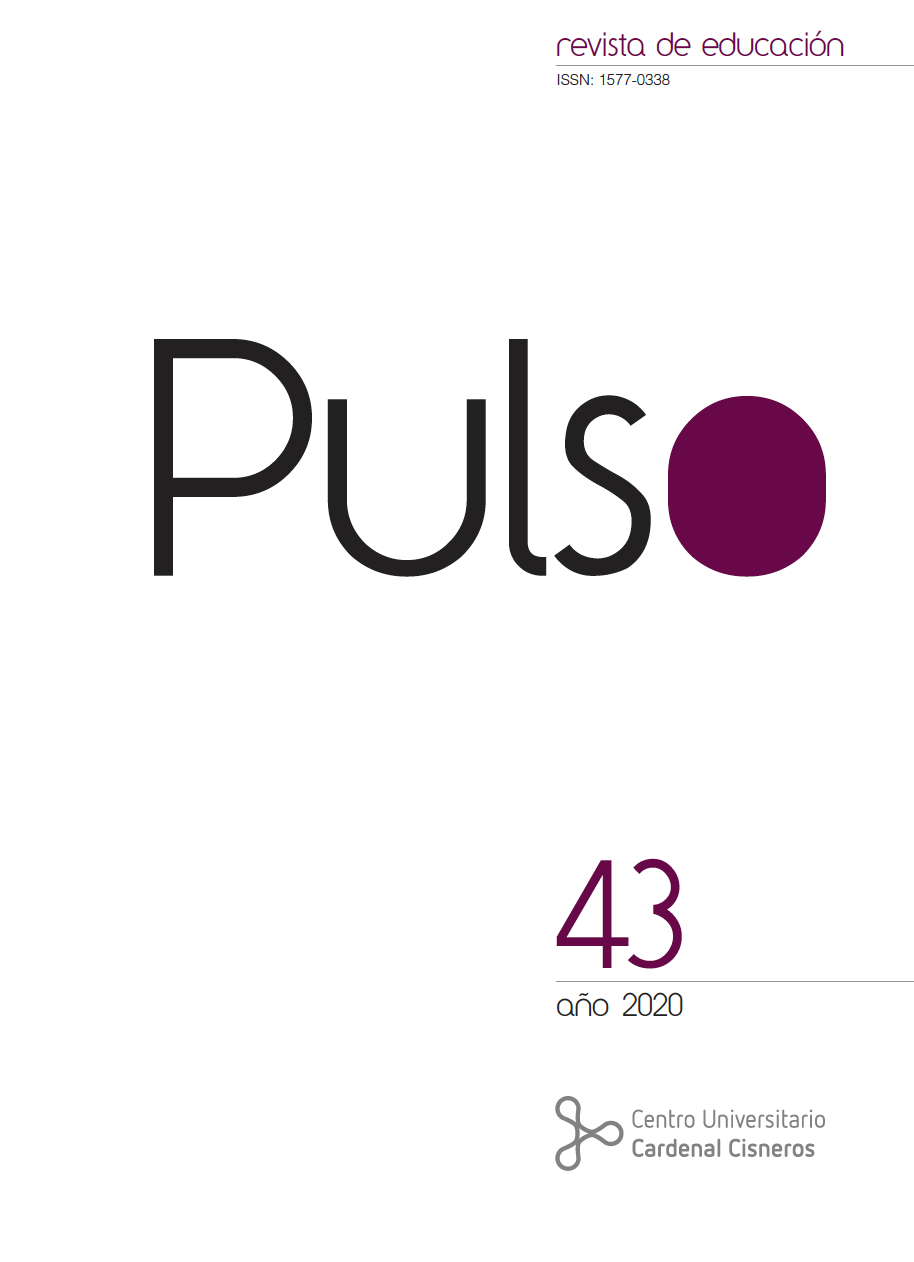Studiositas and curiositas. A theoretical perspective on the study habit
DOI:
https://doi.org/10.58265/pulso.4804Abstract
This article approaches the way in which studiositas and curiositas operates in middle, high school, and college students’ behavior. This approach has a structure of solid argumentation that allows us to visualize Thomas Aquinas’ analysis of studiositas and curiositas in the context of formal education. To achieve this visualization, some daily practices that reflect these habits in the students’ behavior are highlighted. In order to bridge these realities, the analytical-comparative method of interpretation is used. In this method, the definitions of both categories are reviewed as they appear in the Summa Theologica, and they are put in contrast with some recurrent students’ attitudes. After the review of the bibliography, one of the evident results is the insufficiency or almost nullity of the works done on this area. This void stimulates the undertaking of more research in this direction. In conclusion, the debate on the inclusion of studiositas and the prevention of curiositas in formal education can only be left open. This paper suggests some possible lines of theoretical and practical exploration to do so.
Downloads
References
Aristóteles (1994). Metafísica (T. Calvo Martínez, Tr.). Madrid: Editorial Gredos.
Aristóteles (2014a). Ética a Nicómaco (J. Pallí Bonet, Tr.). Madrid: Editorial Gredos.
Aristóteles (2014b). Acerca del alma (T. Calvo Martínez, Tr.). Madrid: Editorial Gredos.
Corazón G., R. (2016). Filosofía del conocimiento (2a ed.). Pamplona: EUNSA.
Del Barrio, J. & Borragán, A. (2011). Cómo atraer la atención hablando. Un reto para la enseñanza. Bordón. Revista de Pedagogía, 63 (2), 15-26. Recuperado de https://recyt.fecyt.es/index.php/BORDON/article/view/28968/15444
Fernández, J. (1952). Corrección de los hábitos de estudio. Revista española de pedagogía, 10 (38), 219-239. Recuperado de https://revistadepedagogia.org/wp-content/uploads/2018/06/3CorreccionDeLosHabitosDeEstudio.pdf
Fisher, K. (2000). Curiouser and Curiouser: The Virtue of Wonder. Journal of Education, 182 (2), 34-42. https://doi.org/10.1177/002205740018200205
Guitton, J. (1999). El trabajo intelectual. Consejos a los que estudian y a los que escriben. Madrid: Ediciones Rialp.
Irizar, L. (2012). La dimensión ética de la vida intelectual. En L. B. Irizar, G. Zanotti & S. L. Brock, En la era de la cienciometría: una antropología de la investigación científica (pp. 145-171). Medellín: Editorial Universidad Pontificia Bolivariana.
Llano, A. (1991). Gnoseología (3a ed.). Pamplona: EUNSA.
Llano, A. (2003). Repensar la Universidad. La Universidad ante lo nuevo. Madrid: EIUNSA.
Martínez-Otero, V. & Torres, L. (2005). Análisis de los hábitos de estudio en una muestra de alumnos universitarios. Revista Iberoamericana de Educación, 36 (7), 1-8. https://doi.org/10.35362/rie3672929
Millán-Puelles, A. (2009). Las dimensiones morales del interés por la verdad. Anuario filosófico, 42 (96), 531-553. Recuperado de https://dadun.unav.edu/bitstream/10171/18636/1/A.%20MILL%-c3%81N-PUELLES.pdf
Montes, I. (2012). Investigación longitudinal de los hábitos de estudio en una cohorte de estudiante universitarios. Revista Lasallista de Investigación, 9 (1), 96-110. Recuperado de https://www.redalyc.org/pdf/695/69524955005.pdf
Mora, F. (2018, julio 18). El maestro es la joya de la corona de un país [archivo de video]. Recuperado
de https://aprendemosjuntos.elpais.com/especial/que-es-la-neuroeducacion-francisco-mora/
Naval, C. (2008). Enseñar y aprender: Una propuesta didáctica. Pamplona: EUNSA. Recuperado de https://ebookcentral.proquest.com
Núñez, J. (2014). La studiositas y su lugar en el organismo cristiano de las virtudes. Excerpta et dissertationibus in Sacra Theologia, 62, 465-535. Recuperado de https://dadun.unav.edu/bitstream/10171/36493/1/62_07_nunez%20valero.pdf
Philips, R. (2015. Curiosity: Care, Virtue and Pleasure in Uncovering the New. Theory, Culture & Society, 32 (3), 149-161. https://doi.org/10.1177/0263276414565718
Pieper, J. (2010). Las virtudes fundamentales (3a ed.). Madrid: Ediciones Rialp. Disponible en https://isfdnsfatima.files.wordpress.com/2012/03/pieper-las-virtudes-fundamentales.pdf
Ramos, A. (2005). Studiositas and Curiositas: Matters for Self-Examination. Disponible en https://files.eric.ed.gov/fulltext/EJ781983.pdf
Reichberg, G. (s. f.). Studiositas, The Virtue of Attention. Disponible en https://maritain.nd.edu/ama/McInerny/McInerny11.pdf
Rodríguez, A. (2012). Ética general (6a ed.). Pamplona: EUNSA.
Tomás de Aquino (s. f.) Suma Teológica. Recuperado de http://hjg.com.ar/sumat/index.html
Tomás de Aquino (1999). Cuestiones disputadas sobre el alma (E. Téllez, Tr.). Pamplona: EUNSA. Recuperado de http://www.traditio-op.org/biblioteca/Aquino/Cuestiones_disputadas_sobre_el_alma,_Santo_Tomas_de_Aquino.pdf
Torchia, J. (2012). Restless mind: Curiositas & the scope of inquiry in st. augustine’s psychology. Recuperado de https://ebookcentral.proquest.com
Tourón, J. (1989). Métodos de estudio en la Universidad. Pamplona: EUNSA.
Tourón, J. & Martín, D. (2019). Aprender y enseñar hoy: retos para los profesores. Nueva Revista. De política, cultura y arte, 167. Recuperado de https://www.nuevarevista.net/universidad/aprender-y-ensenar-hoy-retos-para-los-profesores/
Yepes, R. & Aranguren, J. (2003). Fundamentos de Antropología. Un ideal de la excelencia humana (6a ed.) Pamplona: EUNSA.
Vásquez, D. (2009). La virtud de la studiositas y el conocimiento. Un estudio desde Santo Tomás de Aquino (Tesis doctoral). Recuperado de https://dadun.unav.edu/bitstream/10171/20611/1/02_
Cuadernos%20Filosofia%2021.pdf
Vélez, A. (2008). La adquisición de hábitos como finalidad de la educación superior. Educación y educadores,11 (1), 167-180. Recuperado de https://educacionyeducadores.unisabana.edu.co/index.php/eye/article/view/723/1701
Downloads
Published
How to Cite
Issue
Section
License
Copyright (c) 2022 Pulso. Revista de educación

This work is licensed under a Creative Commons Attribution-NonCommercial-NoDerivatives 3.0 Unported License.
This journal offers immediate open access to its content based on the idea that offering readers free access to research favours a global exchange of knowledge.
Papers are published in the electronic version of the journal under a Creative Commons License: Attribution-NonCommercial-No derivatives 4.0 International
Authors are allowed and encouraged to promote the post-print version (reviewed and accepted for publication version) of their work online before publishing them. This favours their earlier circulation and dissemination and thus a possible increase in their citation and reach among the academic community.














